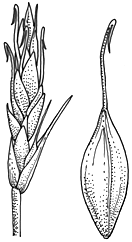Common name: Compact Hook-sedge
Carex austrocompacta K.L.Wilson APNI* Synonyms: Uncinia compacta R.Br. APNI*

Description: Loosely tufted perennial with slender rhizome. Culms trigonous, usually scabrous above, 8–35 cm high, 0.8–1.1 mm diam.
Leaves quite thick and stiff, often broadly keeled, shorter than or equalling culms, 2–3.5 mm wide.
Inflorescence ± dense, 0.8–2.5 cm long including male portion 6–11 mm long. Female glumes deciduous, acute, faintly few-nerved, 4–5 mm long, straw-coloured to yellow-brown, often tinged red-brown on sides, membranous, with narrow hyaline margins. Stamens 3. Perigynia (utricles) obliquely spreading at maturity, trigonous, ovoid to ellipsoid, tapering to base and apex, 4.5–5 mm long, 1.8–2 mm diam., smooth and shining, shorter than or equalling glumes, with hook-like tip of rachilla protruding beyond the perigynium apex.
Nut obovoid, c. 3 mm long, c. 2 mm diam., dark brown, glistening, minutely pusticulate.
Flowering: summer.
Distribution and occurrence: Grows in the Kosciusko area. Also in Vic and Tas. Alpine and subalpine.
NSW subdivisions: ST
Other Australian states: Vic. Tas.
Text by K. L. Wilson (1993); edited KL Wilson (Aug 2016, Aug 2017, March 2023)
Taxon concept: Flora of NSW 4 (1993) as Uncinia flaccida
APNI* Provides a link to the Australian Plant Name Index (hosted by the Australian National Botanic Gardens) for comprehensive bibliographic data
***The AVH map option provides a detailed interactive Australia wide distribution map drawn from collections held by all major Australian herbaria participating in the Australian Virtual Herbarium project.
|


